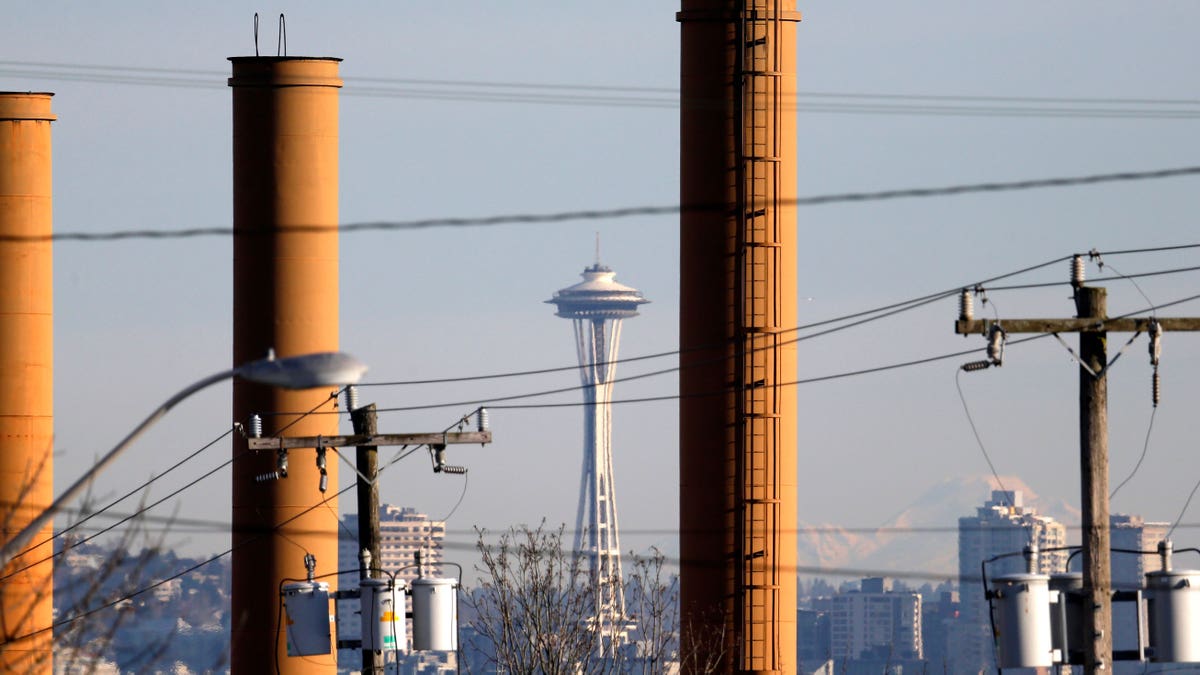Reporter who confronted John Kerry on carbon footprint rips 'out of touch' leaders
Avi Yemini, chief reporter for Rebel News, joins 'Fox & Friends First' to discuss the 'huge' carbon footprint of the Davos event each year and the hypocrisy of attendees who refuse to answer 'basic questions' on sustainability.
A conservative-backed effort to repeal Washington state's landmark carbon pricing program and tax on the sale of stocks and bonds is putting the budget into limbo, with billions of dollars at stake in the final days of this year’s Legislative session.
Lawmakers are scrambling to finalize a trio of statewide supplemental budgets that feature new investments in everything from curbing the opioid crisis to electric ferries before the regular session ends March 7. But initiatives that are expected for the November ballot could cumulatively strip more than $2.1 billion from the bottom line.
The initiatives to repeal the state’s landmark Climate Commitment Act and the tax on the sale of stocks and bonds are part of a broader effort by conservatives to overturn some of the biggest recent policy wins by the majority Democratic party.
"While yes there's a lot of pet projects that wouldn’t be funded going forward, a lot of that money was one time anyways," said Rep. Chris Corry, top Republican on the House appropriations committee. "But the direct result is consumers will have more money in their paychecks, which is what they’re telling us they want."
Losing the carbon emissions pricing program could remove $1.3 billion from the budget and ending the tax on the sale of stocks and bonds could remove another $833 million in fiscal year 2025 alone if the initiatives took effect by June 6, according to estimates provided by the Office of Financial Management. Those numbers would likely be smaller if they aren’t approved until November, a spokesperson for the office said.
The result has been lawmakers working to finalize multibillion-dollar budgets that run through fiscal year 2025 with caveats sprinkled throughout.

The Space Needle is seen between defunct stacks at a steel plant in Seattle on Feb. 25, 2016. A conservative-backed effort to repeal Washington state's landmark carbon pricing program and tax on the sale of stocks and bonds leaves billions of dollars at stake with just days left in this year's Legislative session. (AP Photo/Elaine Thompson, File)
"You can’t cut billions of dollars out of the state budget without really impacting people," said Democratic Rep. Joe Fitzgibbon, House majority leader. "And that’s something that we’re trying to really make clear to Washingtonians this year."
The last time Fitzgibbon said he remembers an initiative having such a big impact on the state transportation and operating budgets was about 25 years ago, when voters repealed the state’s motor vehicle excise tax, eliminating up to $1.1 billion in state revenues in 1999-2001.
Dozens of programs funded through the carbon pricing program will have belated start dates of Jan. 1, 2025, and stipulations that they would not take effect if these funds disappear. In one instance a budget assumes less revenue from the program in 2024 to better prepare for it potentially disappearing. Another budget stipulates that unspent money generated by the program would go to an account that could be tapped into even if voters repealed the program.
The capital gains tax is more difficult to preemptively adjust for, as most of the programs it funds are written into state laws, Fitzgibbon said. The money from the tax funds the Fair Start for Kids Act, for example, which helps makes childcare and early learning more affordable — and if it is repealed by voters, lawmakers would have to reconsider keeping that in place.
Some Republican lawmakers see the talk surrounding these initiatives as fearmongering, explaining that this funding did not exist before the current biennial budget period and the state would make do without it. Both the carbon pricing program and the capital gains tax are relatively new, with funds first coming in in 2023.
"We have enough money to fund priorities of government that include a variety of – whether it’s social programs, roads, ferries, bridges," said Corry. "Yes, there’s additional revenues in there, but they come at a cost, right? And if you think about it the cost is increase tax burden on Washington consumers."
The 7% capital gains tax on the sale of stocks, bonds and other high-end assets, with exemptions for the first $262,000, goes to childcare and school construction. When enacted in 2021, it was expected to be paid by 7,000 people — fewer than 1 in every 1,000 residents. It is known as a volatile revenue source, subject to change.
The 1-year-old Climate Commitment Act, which works to cap and reduce pollution while creating revenue for investments that address climate change, raised $1.8 billion in 2023 through quarterly auctions in which emission allowances are sold to businesses covered under the act.
If voter-approved initiatives succeed in November, the impact would likely extend beyond specific areas of funding.
CLICK HERE TO GET THE FOX NEWS APP
Democratic Majority Leader Sen. Andy Billig has given the example of the Senate’s $14.6 billion transportation budget proposal, explaining that some things funded by the carbon pricing program will likely remain because they’re so important.
"What’s going to happen is we’re going to have to reprioritize everything in transportation," he told reporters recently. "That's why basically everything in the transportation budget, which is already a budget under a lot of duress, will be in question if the Climate Commitment Act fails."
These initiatives are just two of six certified after a conservative group submitted hundreds of thousands of signatures in support of them. The Legislature is considering one on Tuesday and expected to consider two others later this week, while the carbon pricing program and capital gains tax, which would have the biggest impact on the state’s budget if they were repealed, will likely head straight to voters.












































